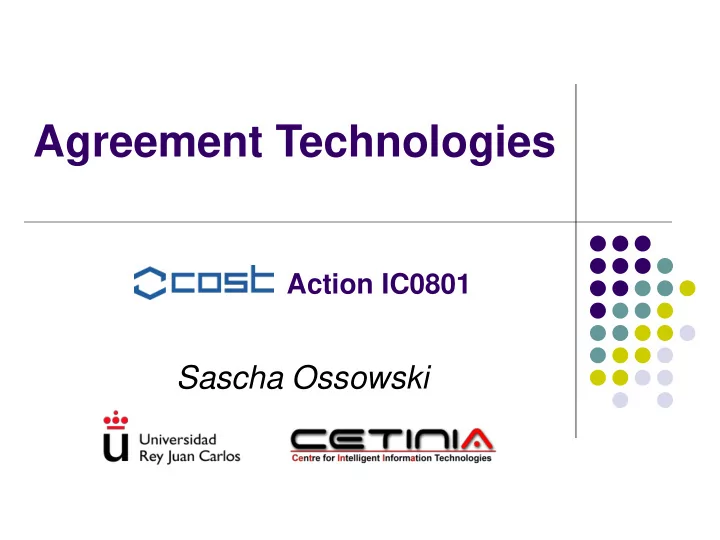

Agreement Technologies Action IC0801 Sascha Ossowski
Agreement Technologies Social Science Large-scale open distributed systems Area of enormous social and economic − potential Paradigm Shift : beyond the client-server − architectures… Agreement Vision: A paradigm for next-generation open − distributed systems, based on the concept of agreement between computational Semantic Multiagent agents . Technologies Systems JISBD’09 09/09/2009
Strands of research Fundamental and applied research: Semantics: Semantic mismatches & alignment of ontologies − Trust Norms: Specify and verify constraints on agreement − Argumentation Organisations: Structure the processes of reaching − & Negotiation agreements Organisations Argumentation & Negotiation: Reach agreements that − Norms respect the constraints imposed by norms and organisations Semantics Trust: Summarise the history of agreements and agreement − executions in order to build long-term relation Interdisciplinary research: Solid conceptual foundations : robust understanding of the notion of agreement and agreement processes JISBD’09 09/09/2009
COST Action on Agreement Technologies Several research initiatives are currently ongoing around Europe and worldwide that address (some of) these challenges COST Action IC0801 on “ Agreement Technologies ” : Europ. Cooperation in the field of Scientific and Technical Research − − Duration: 10/2008 ̶ 10/2012 (4 years) − Overall mission : “ to support and promote the harmonization of nationally-funded high-quality research towards a new paradigm for next generation distributed systems based on the notion of agreement between computational agents... ” − Networking activities: coordination of research & training JISBD’09 09/09/2009
Action Activities • Activity A1: Working Group Workshops Research coordination through effective knowledge and result exchange Focused und the five key topics of Agreement Technologies • Activity A2: Ad hoc Seminars Small-scale (low cost) meetings, possibly co-located with other events • Activity A3: Coordination visits for senior researchers STSM programme: joint research/ funding proposal preparation • Activity A4: Training visits for early-stage researchers STSM programme: European PhD label/ jointly supervised PhDs • Activity A5: Early-stage-researchers meetings Raise awareness of the necessities of PhD students and young PostDocs JISBD’09 09/09/2009
Action Activities • Activity A6: Training School in Agreement Technologies Training events open to both participants from academia and industry Possibly in co-operation with existing training schools • Activity A7: Agreement Technologies Industrial Days Project the prospective benefits of AT to European Industry • Activity A8: Agreement Technologies Handbook Reference for the state of the art in AT, its applications and industrial potential • Activity A9: Dissemination and Exploitation Classic dissemination means including liaisons & central Action Web Site Promotion of bi/multi-lateral research funding proposals among members JISBD’09 09/09/2009
COST Action on Agreement Technologies ● Action member countries (as of September 2009): 21 countries signed MoU 5 non-COST countries ● MC : up to 2 representatives per Action member country ● Scientists from Action member countries can fully participate in the Action‟s activities ● COST “Open door policy” JISBD’09 09/09/2009
Institutions from non-COST Countries JISBD’09 09/09/2009
Management Structure Action Office Vicent Manager Sascha Ossowski Botti Management Committee Other Action Action Cristiano Marco Axel Leila Carles Stakeholders Co-Chair Chair Castelfranchi Polleres Colombetti Amgoud Sierra Core Group WG1 WG2 WG3 WG4 WG5 Chair Chair Chair Chair Chair Advisory Board WG WG WG WG Neg. & WG Semantics Norms Organizations Argumentation Trust JISBD’09 09/09/2009
Working groups • Semantic alignment: WG1 WG1 Semantics – to explore the right tradeoffs between Semantics expressivity and efficiency for ontology, mapping and query languages in a WG5 WG2 distributed setting Trust Norms – to study semantic alignment protocols and algorithms interweaving alignment and negotiation, and possibly taking into account measures of trust • Alignment with standards: WG4 WG3 Negotation & – to explore how existing standardization Organisation Argumentation efforts can be enhanced to cater for agreement relevant information, and how these additions can be exploited JISBD’ 09 09/09/2009
Working groups • Normative reasoning and negotiated WG1 Semantics flexibility – to interpret and instantiate norms to specific situations; WG2 WG5 WG2 – to resolve conflicts between norms, Norms Trust Norms especially when applied to a specific case – to study norm transgression as a motor for the evolution of norms (and organisational change) WG4 WG3 Negotation & • Organisation Usability of norms: Argumentation – enhance user awareness of (and control on) norms JISBD’09 09/09/2009
Working groups • Design and evolution of organisations WG1 – to advance on effective guidelines & Semantics tools for the design of organisational structures, especially wrt. the reuse of norms/organisational patterns WG5 WG2 Trust Norms – to account for organisational change, as in open environments organisational structures continuously evolve so as to efficiently promote effective teamwork • Organisational Teamwork WG4 WG3 WG3 – to exploit organisational information in Negotation & Organisation Organisation Argumentation the processes of team formation, cooperation, and dissolution, based upon dynamic agreements at runtime JISBD’ 09 09/09/2009
Working groups • Argumentation in negotiation: WG1 Semantics – to look into frameworks that integrate argumentation in negotiation, so as to supply the negotiating parties with WG5 WG2 Trust Norms additional information and help them convince each other by adequate arguments. • Strategies for bounded interactions: WG4 WG4 – to study mechanisms that can meet the WG3 Negotiation & Negotation & Organisation Argumentation computational bounds to agreement Argumentation processes based on argumentation and negotiation JISBD’09 09/09/2009
Working groups • Advanced trust mechanisms: WG1 Semantics – Scalability: how to develop trust mechanisms based on other agents‟ opinions that scale on large societies WG5 – Semantics: how to deal with WG5 WG2 Trust Trust Norms erroneous behaviour that may be caused by misunderstandings – Similarity : how to use „similar‟ cases when exact past experiences for an agreement under discussion is scarce WG4 • Balance between norms and trust: WG3 Negotation & Organisation – The more norms can be enforced, the Argumentation less need to rely on trust measures, but norm enforcement has an associated cost JISBD’ 09 09/09/2009 14
Agreement Technologies Action IC0801 http://www.agreement-technologies.eu
Recommend
More recommend